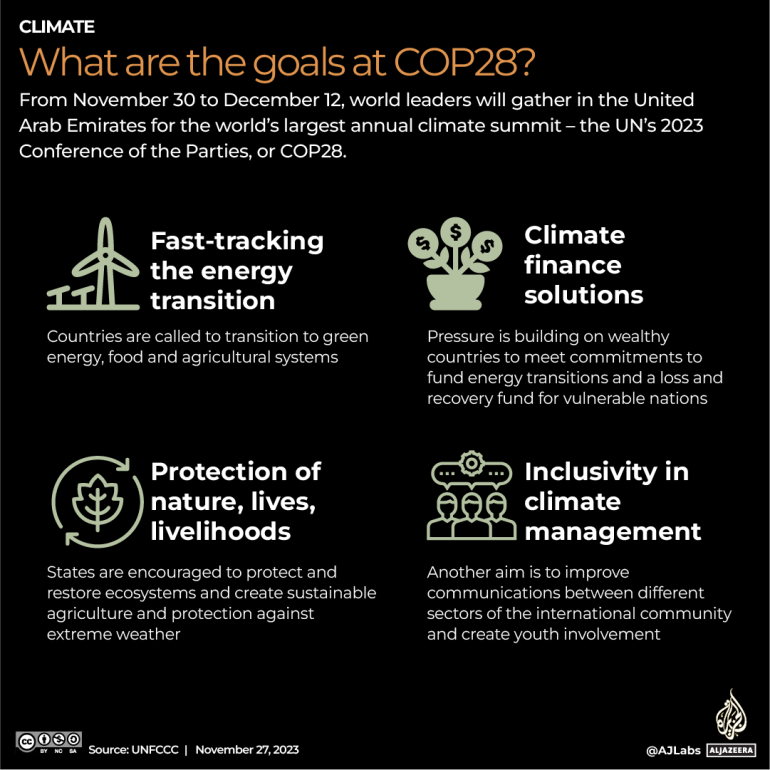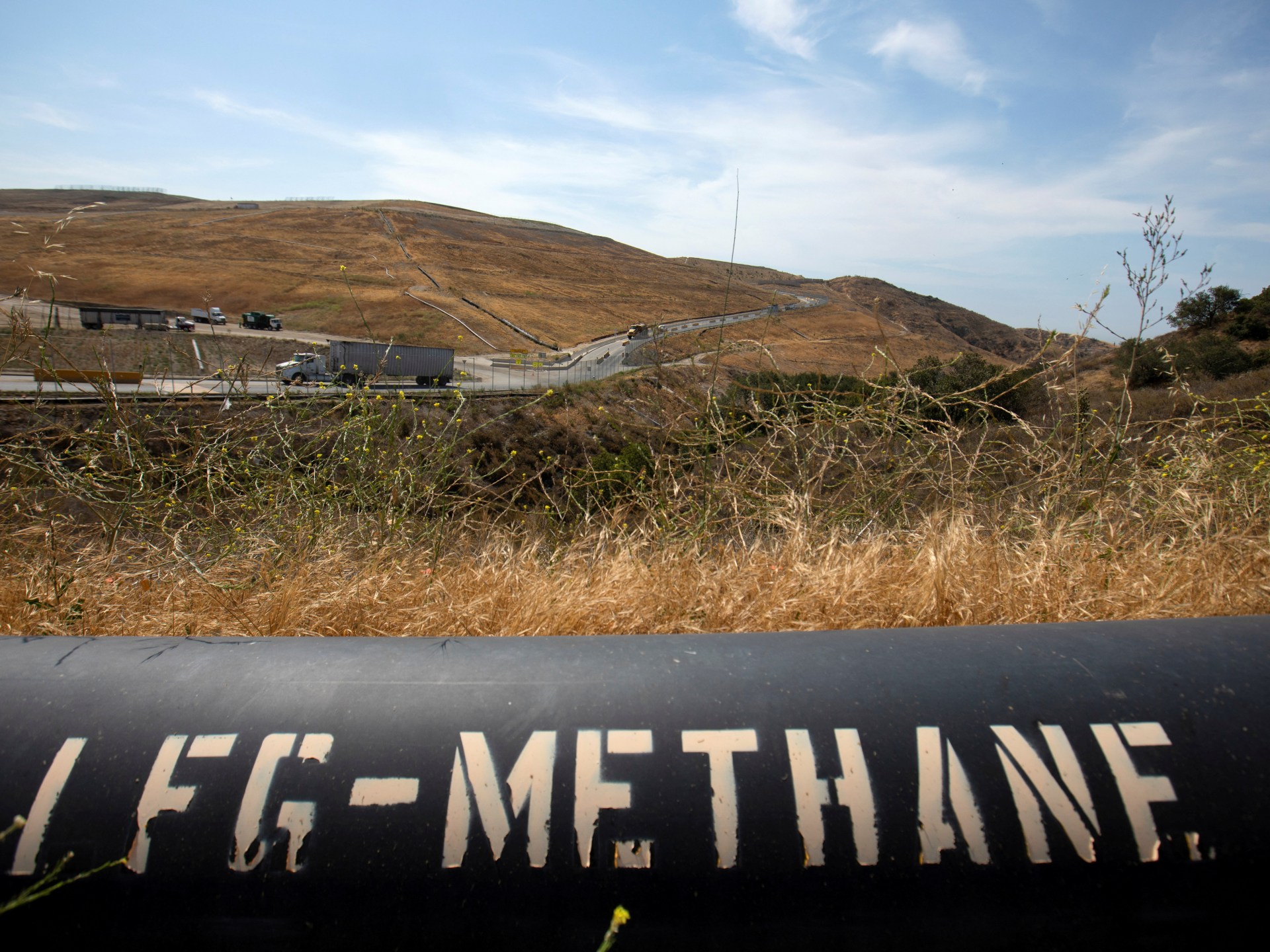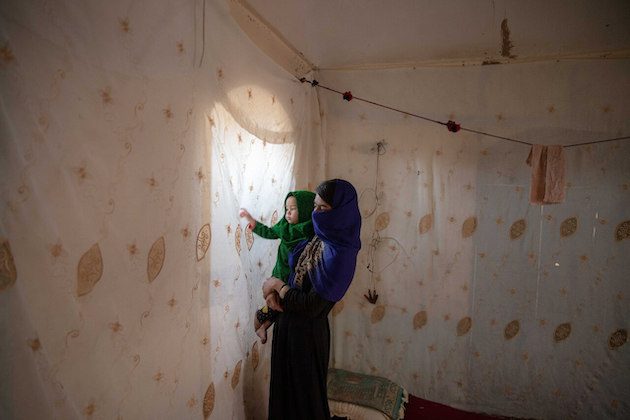Oil companies pledge to lower methane emissions at COP28 | Climate Crisis News
Fifty oil companies representing nearly half of global production have pledged to reach near-zero methane emissions and end routine flaring in their operations by 2030, but environmental groups have called it a “smokescreen”.
Sultan al-Jaber, the president of the United Nations climate summit (COP28) held in Dubai this year, made the announcement on Saturday, saying the pledge included major national oil companies such as Saudi Aramco, Brazil’s Petrobras and Sonangol from Angola and multinationals like Shell, TotalEnergies and BP.
“The world does not work without energy,” al-Jaber said. “Yet the world will break down if we do not fix energies we use today, mitigate their emissions at a gigaton scale and rapidly transition to zero carbon alternatives.”
Methane can be released at several points along the operation of an oil and gas company, from fracking to when natural gas is produced, transported or stored. It persists in the atmosphere for less time than carbon dioxide, but it’s more than 80 times more powerful than the greenhouse gas most responsible for climate change.
Al-Jaber, also the head of the Abu Dhabi National Oil Co, has maintained that having the industry’s buy-in is crucial to drastically slashing greenhouse emissions and limiting global warming.
However, environmental groups were quick to criticise the pledge. It is a “smokescreen to hide the reality that we need to phase out oil, gas and coal”, said a letter signed by more than 300 civil society groups.
Cutting methane emissions
The administration of US President Joe Biden unveiled on Saturday final rules aimed at cracking down on US oil and gas industry releases of methane.
Several governments, philanthropies and the private sector said they have also mobilised $1bn in grants to supports countries’ efforts to tackle the potent gas.
Two major emitters of methane, Turkmenistan and Kazakhstan, joined the Global Methane Pledge, a voluntary agreement by more than 150 countries to slash their methane emissions by 30 percent by 2030.
The World Bank on Saturday launched an 18-month “blueprint for methane reduction”, which will set up 15 national programmes aimed at cutting methane emissions from activities like rice production, livestock operations and waste management.
This year, European Union negotiators also reached a deal to reduce methane emissions from the energy industry across the 27-member bloc. The agreement bans routine venting and flaring and mandates strict reporting. By 2027, it will expand those norms to oil and gas exporters outside the bloc.

Other pledges
A slew of other announcements aimed at decarbonising the energy sector were made at COP28 on Saturday.
The US pledged $3bn to the Green Climate Fund, Vice President Kamala Harris said.
With more than $20bn in pledges, the fund is the largest of its kind dedicated to supporting climate action in developing countries. The $3bn would be in addition to another $2bn previously delivered by the US. In a written statement, the US Treasury said the new pledge is subject to funding availability.
A commitment by 117 countries, led by the EU, the US and the United Arab Emirates, also aims to triple renewable energy capacity worldwide by 2030 and double the annual rate of energy efficiency improvements.
Pledge backers included Brazil, Nigeria, Australia, Japan, Canada, Chile and Barbados. While China and India have signalled support for it, neither backed the overall pledge on Saturday – which pairs the ramp-up in clean power with a reduction in fossil fuel use.
A declaration was also signed by more than 20 countries aiming to triple nuclear power capacity by 2050 with US climate envoy John Kerry saying the world cannot achieve “net zero” emissions without building new reactors.
“We are not making the argument that this is absolutely going to be the sweeping alternative to every other energy source,” he said during a launch ceremony. “But … you can’t get to net-zero 2050 without some nuclear, just as you can’t get there without some use of carbon capture, utilisation and storage.”
Global nuclear capacity now stands at 370 gigawatts with 31 countries running reactors. Tripling that capacity by 2050 would require a significant scaling-up in new approvals and finance.
Check out our Latest News and Follow us at Facebook
Original Source







